Ethical Issues in Healthcare: A Case Study on Euthanasia Debate
VerifiedAdded on 2023/06/05
|6
|2000
|108
Case Study
AI Summary
This case study delves into the ethical complexities faced by healthcare professionals in Australia, particularly concerning end-of-life decisions. It presents the scenario of Arthur, a patient suffering from a degenerative disorder, and his daughter Jane's request to withhold resuscitation in the event of a cardiac arrest. The study navigates the legal and moral implications of euthanasia, which remains illegal in Australia, and the conflict between a healthcare provider's duty to preserve life and respecting a patient's (or their representative's) wishes. It emphasizes the importance of patient consent, the potential for abuse, and the ethical considerations that guide healthcare practices, ultimately arguing against assisted suicide and advocating for comprehensive care and support for patients like Arthur.
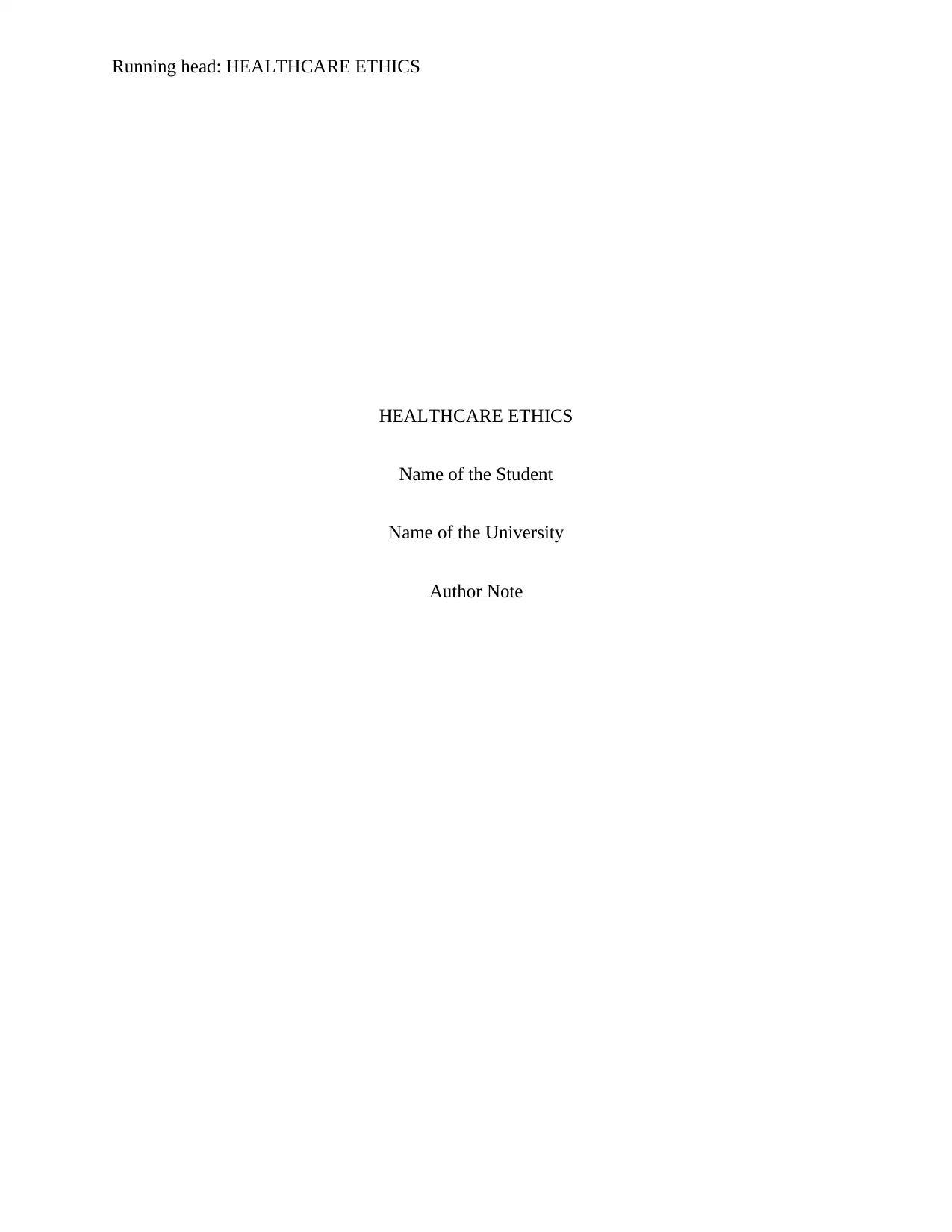
Running head: HEALTHCARE ETHICS
HEALTHCARE ETHICS
Name of the Student
Name of the University
Author Note
HEALTHCARE ETHICS
Name of the Student
Name of the University
Author Note
Paraphrase This Document
Need a fresh take? Get an instant paraphrase of this document with our AI Paraphraser
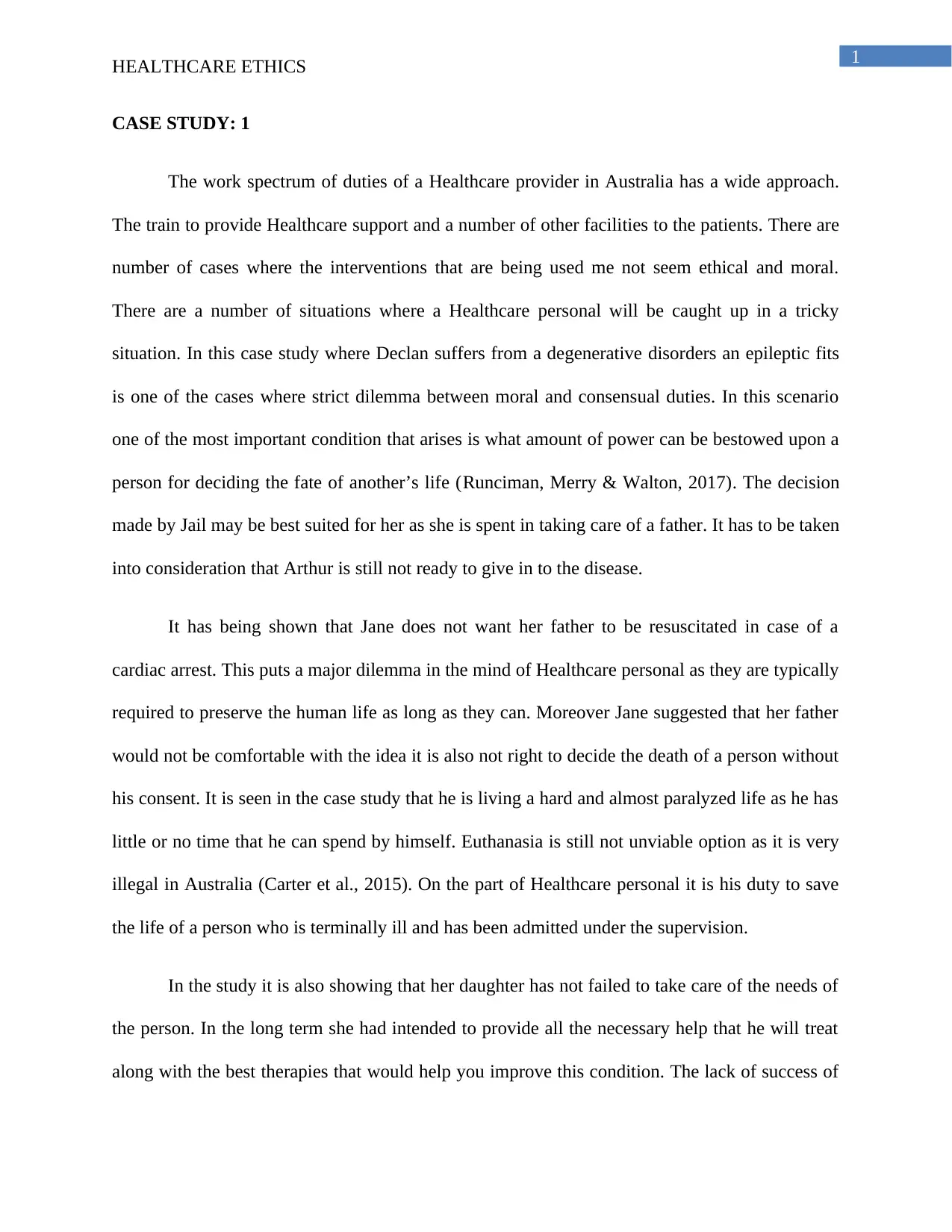
1
HEALTHCARE ETHICS
CASE STUDY: 1
The work spectrum of duties of a Healthcare provider in Australia has a wide approach.
The train to provide Healthcare support and a number of other facilities to the patients. There are
number of cases where the interventions that are being used me not seem ethical and moral.
There are a number of situations where a Healthcare personal will be caught up in a tricky
situation. In this case study where Declan suffers from a degenerative disorders an epileptic fits
is one of the cases where strict dilemma between moral and consensual duties. In this scenario
one of the most important condition that arises is what amount of power can be bestowed upon a
person for deciding the fate of another’s life (Runciman, Merry & Walton, 2017). The decision
made by Jail may be best suited for her as she is spent in taking care of a father. It has to be taken
into consideration that Arthur is still not ready to give in to the disease.
It has being shown that Jane does not want her father to be resuscitated in case of a
cardiac arrest. This puts a major dilemma in the mind of Healthcare personal as they are typically
required to preserve the human life as long as they can. Moreover Jane suggested that her father
would not be comfortable with the idea it is also not right to decide the death of a person without
his consent. It is seen in the case study that he is living a hard and almost paralyzed life as he has
little or no time that he can spend by himself. Euthanasia is still not unviable option as it is very
illegal in Australia (Carter et al., 2015). On the part of Healthcare personal it is his duty to save
the life of a person who is terminally ill and has been admitted under the supervision.
In the study it is also showing that her daughter has not failed to take care of the needs of
the person. In the long term she had intended to provide all the necessary help that he will treat
along with the best therapies that would help you improve this condition. The lack of success of
HEALTHCARE ETHICS
CASE STUDY: 1
The work spectrum of duties of a Healthcare provider in Australia has a wide approach.
The train to provide Healthcare support and a number of other facilities to the patients. There are
number of cases where the interventions that are being used me not seem ethical and moral.
There are a number of situations where a Healthcare personal will be caught up in a tricky
situation. In this case study where Declan suffers from a degenerative disorders an epileptic fits
is one of the cases where strict dilemma between moral and consensual duties. In this scenario
one of the most important condition that arises is what amount of power can be bestowed upon a
person for deciding the fate of another’s life (Runciman, Merry & Walton, 2017). The decision
made by Jail may be best suited for her as she is spent in taking care of a father. It has to be taken
into consideration that Arthur is still not ready to give in to the disease.
It has being shown that Jane does not want her father to be resuscitated in case of a
cardiac arrest. This puts a major dilemma in the mind of Healthcare personal as they are typically
required to preserve the human life as long as they can. Moreover Jane suggested that her father
would not be comfortable with the idea it is also not right to decide the death of a person without
his consent. It is seen in the case study that he is living a hard and almost paralyzed life as he has
little or no time that he can spend by himself. Euthanasia is still not unviable option as it is very
illegal in Australia (Carter et al., 2015). On the part of Healthcare personal it is his duty to save
the life of a person who is terminally ill and has been admitted under the supervision.
In the study it is also showing that her daughter has not failed to take care of the needs of
the person. In the long term she had intended to provide all the necessary help that he will treat
along with the best therapies that would help you improve this condition. The lack of success of
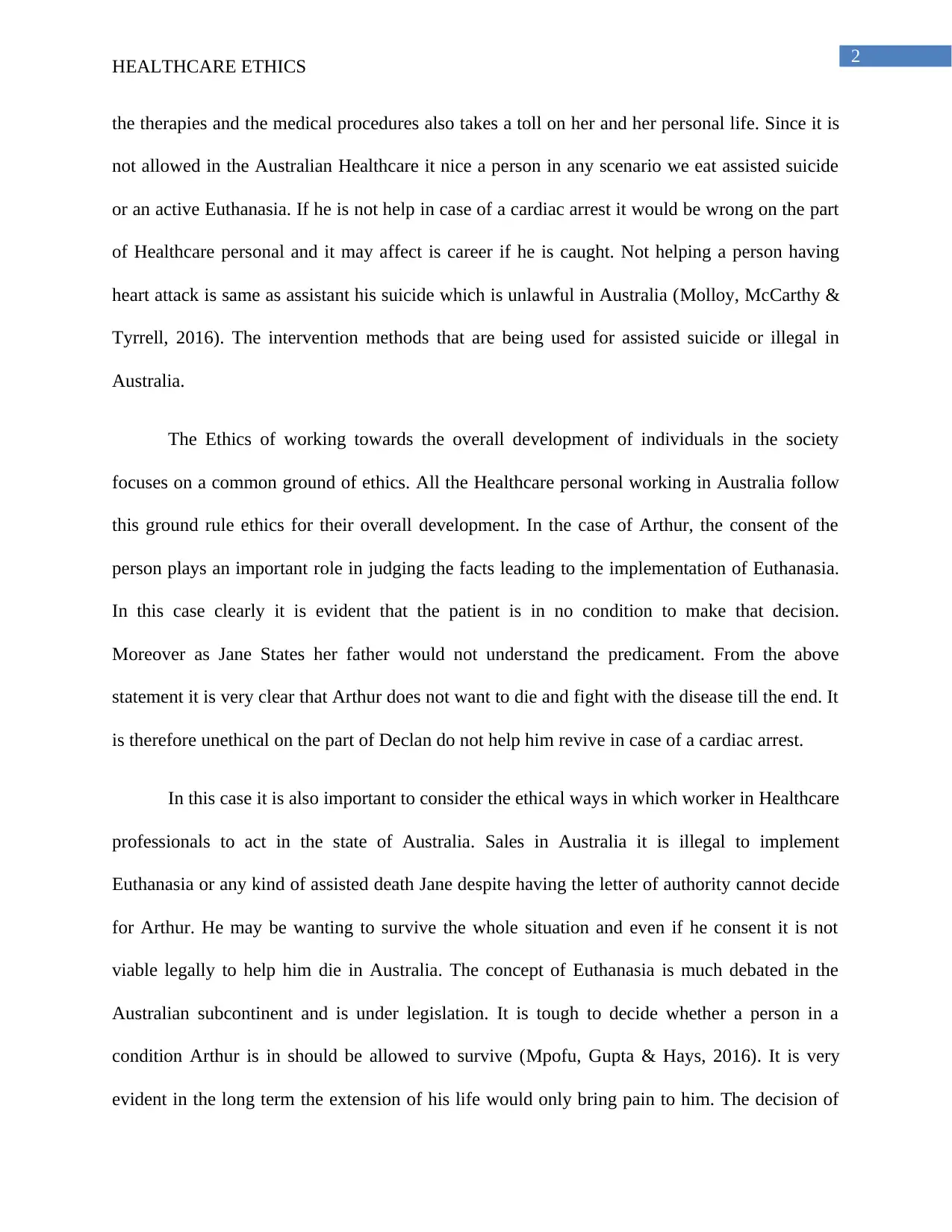
2
HEALTHCARE ETHICS
the therapies and the medical procedures also takes a toll on her and her personal life. Since it is
not allowed in the Australian Healthcare it nice a person in any scenario we eat assisted suicide
or an active Euthanasia. If he is not help in case of a cardiac arrest it would be wrong on the part
of Healthcare personal and it may affect is career if he is caught. Not helping a person having
heart attack is same as assistant his suicide which is unlawful in Australia (Molloy, McCarthy &
Tyrrell, 2016). The intervention methods that are being used for assisted suicide or illegal in
Australia.
The Ethics of working towards the overall development of individuals in the society
focuses on a common ground of ethics. All the Healthcare personal working in Australia follow
this ground rule ethics for their overall development. In the case of Arthur, the consent of the
person plays an important role in judging the facts leading to the implementation of Euthanasia.
In this case clearly it is evident that the patient is in no condition to make that decision.
Moreover as Jane States her father would not understand the predicament. From the above
statement it is very clear that Arthur does not want to die and fight with the disease till the end. It
is therefore unethical on the part of Declan do not help him revive in case of a cardiac arrest.
In this case it is also important to consider the ethical ways in which worker in Healthcare
professionals to act in the state of Australia. Sales in Australia it is illegal to implement
Euthanasia or any kind of assisted death Jane despite having the letter of authority cannot decide
for Arthur. He may be wanting to survive the whole situation and even if he consent it is not
viable legally to help him die in Australia. The concept of Euthanasia is much debated in the
Australian subcontinent and is under legislation. It is tough to decide whether a person in a
condition Arthur is in should be allowed to survive (Mpofu, Gupta & Hays, 2016). It is very
evident in the long term the extension of his life would only bring pain to him. The decision of
HEALTHCARE ETHICS
the therapies and the medical procedures also takes a toll on her and her personal life. Since it is
not allowed in the Australian Healthcare it nice a person in any scenario we eat assisted suicide
or an active Euthanasia. If he is not help in case of a cardiac arrest it would be wrong on the part
of Healthcare personal and it may affect is career if he is caught. Not helping a person having
heart attack is same as assistant his suicide which is unlawful in Australia (Molloy, McCarthy &
Tyrrell, 2016). The intervention methods that are being used for assisted suicide or illegal in
Australia.
The Ethics of working towards the overall development of individuals in the society
focuses on a common ground of ethics. All the Healthcare personal working in Australia follow
this ground rule ethics for their overall development. In the case of Arthur, the consent of the
person plays an important role in judging the facts leading to the implementation of Euthanasia.
In this case clearly it is evident that the patient is in no condition to make that decision.
Moreover as Jane States her father would not understand the predicament. From the above
statement it is very clear that Arthur does not want to die and fight with the disease till the end. It
is therefore unethical on the part of Declan do not help him revive in case of a cardiac arrest.
In this case it is also important to consider the ethical ways in which worker in Healthcare
professionals to act in the state of Australia. Sales in Australia it is illegal to implement
Euthanasia or any kind of assisted death Jane despite having the letter of authority cannot decide
for Arthur. He may be wanting to survive the whole situation and even if he consent it is not
viable legally to help him die in Australia. The concept of Euthanasia is much debated in the
Australian subcontinent and is under legislation. It is tough to decide whether a person in a
condition Arthur is in should be allowed to survive (Mpofu, Gupta & Hays, 2016). It is very
evident in the long term the extension of his life would only bring pain to him. The decision of
⊘ This is a preview!⊘
Do you want full access?
Subscribe today to unlock all pages.

Trusted by 1+ million students worldwide
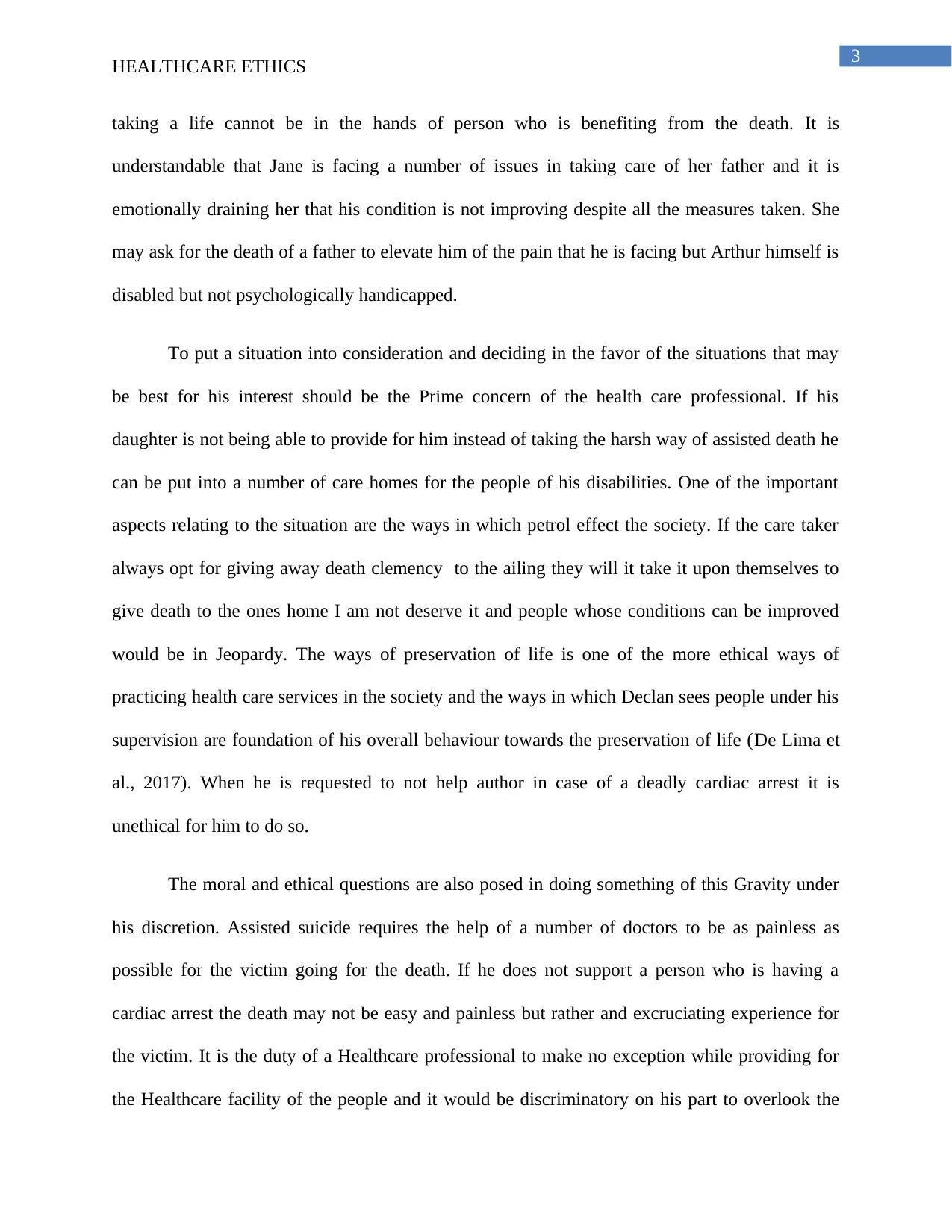
3
HEALTHCARE ETHICS
taking a life cannot be in the hands of person who is benefiting from the death. It is
understandable that Jane is facing a number of issues in taking care of her father and it is
emotionally draining her that his condition is not improving despite all the measures taken. She
may ask for the death of a father to elevate him of the pain that he is facing but Arthur himself is
disabled but not psychologically handicapped.
To put a situation into consideration and deciding in the favor of the situations that may
be best for his interest should be the Prime concern of the health care professional. If his
daughter is not being able to provide for him instead of taking the harsh way of assisted death he
can be put into a number of care homes for the people of his disabilities. One of the important
aspects relating to the situation are the ways in which petrol effect the society. If the care taker
always opt for giving away death clemency to the ailing they will it take it upon themselves to
give death to the ones home I am not deserve it and people whose conditions can be improved
would be in Jeopardy. The ways of preservation of life is one of the more ethical ways of
practicing health care services in the society and the ways in which Declan sees people under his
supervision are foundation of his overall behaviour towards the preservation of life (De Lima et
al., 2017). When he is requested to not help author in case of a deadly cardiac arrest it is
unethical for him to do so.
The moral and ethical questions are also posed in doing something of this Gravity under
his discretion. Assisted suicide requires the help of a number of doctors to be as painless as
possible for the victim going for the death. If he does not support a person who is having a
cardiac arrest the death may not be easy and painless but rather and excruciating experience for
the victim. It is the duty of a Healthcare professional to make no exception while providing for
the Healthcare facility of the people and it would be discriminatory on his part to overlook the
HEALTHCARE ETHICS
taking a life cannot be in the hands of person who is benefiting from the death. It is
understandable that Jane is facing a number of issues in taking care of her father and it is
emotionally draining her that his condition is not improving despite all the measures taken. She
may ask for the death of a father to elevate him of the pain that he is facing but Arthur himself is
disabled but not psychologically handicapped.
To put a situation into consideration and deciding in the favor of the situations that may
be best for his interest should be the Prime concern of the health care professional. If his
daughter is not being able to provide for him instead of taking the harsh way of assisted death he
can be put into a number of care homes for the people of his disabilities. One of the important
aspects relating to the situation are the ways in which petrol effect the society. If the care taker
always opt for giving away death clemency to the ailing they will it take it upon themselves to
give death to the ones home I am not deserve it and people whose conditions can be improved
would be in Jeopardy. The ways of preservation of life is one of the more ethical ways of
practicing health care services in the society and the ways in which Declan sees people under his
supervision are foundation of his overall behaviour towards the preservation of life (De Lima et
al., 2017). When he is requested to not help author in case of a deadly cardiac arrest it is
unethical for him to do so.
The moral and ethical questions are also posed in doing something of this Gravity under
his discretion. Assisted suicide requires the help of a number of doctors to be as painless as
possible for the victim going for the death. If he does not support a person who is having a
cardiac arrest the death may not be easy and painless but rather and excruciating experience for
the victim. It is the duty of a Healthcare professional to make no exception while providing for
the Healthcare facility of the people and it would be discriminatory on his part to overlook the
Paraphrase This Document
Need a fresh take? Get an instant paraphrase of this document with our AI Paraphraser
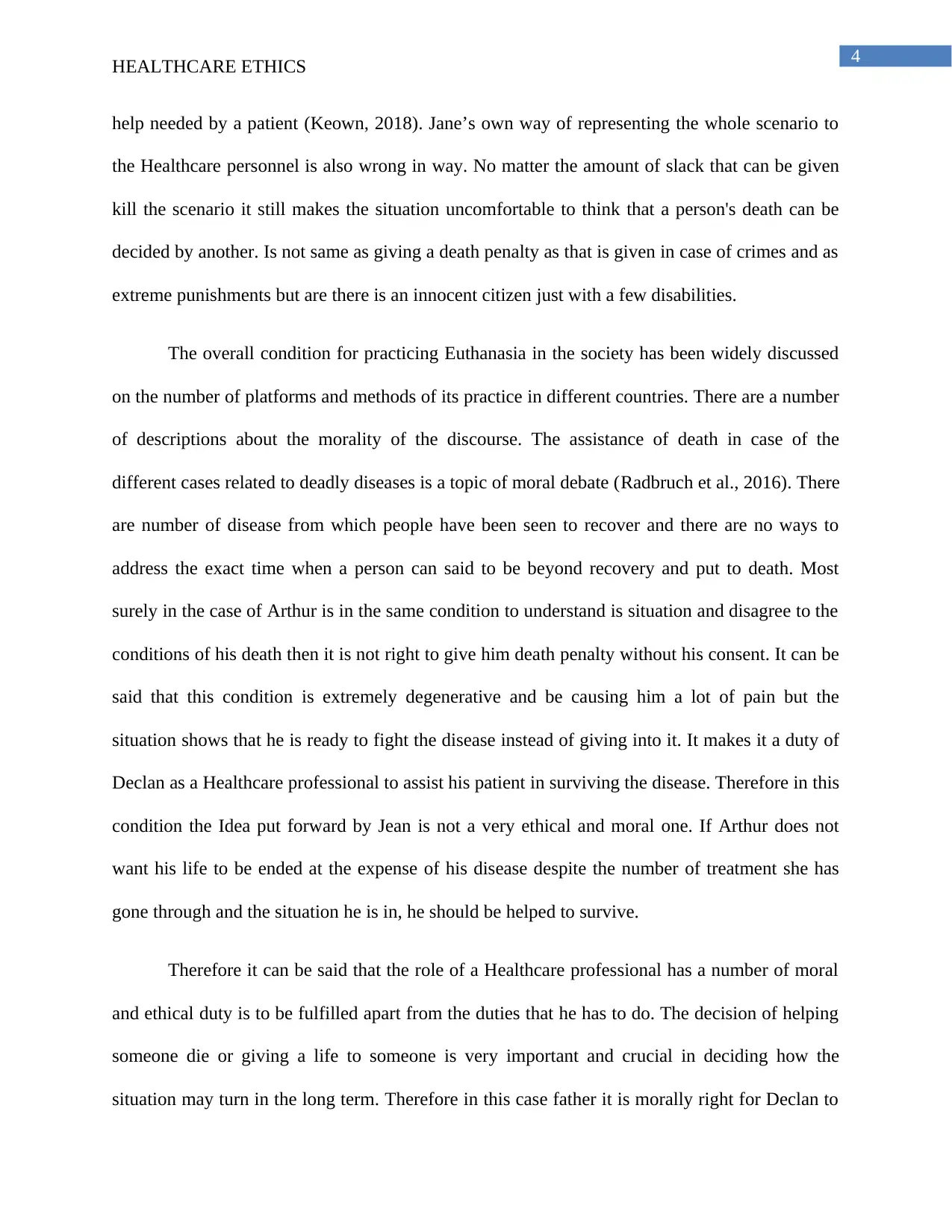
4
HEALTHCARE ETHICS
help needed by a patient (Keown, 2018). Jane’s own way of representing the whole scenario to
the Healthcare personnel is also wrong in way. No matter the amount of slack that can be given
kill the scenario it still makes the situation uncomfortable to think that a person's death can be
decided by another. Is not same as giving a death penalty as that is given in case of crimes and as
extreme punishments but are there is an innocent citizen just with a few disabilities.
The overall condition for practicing Euthanasia in the society has been widely discussed
on the number of platforms and methods of its practice in different countries. There are a number
of descriptions about the morality of the discourse. The assistance of death in case of the
different cases related to deadly diseases is a topic of moral debate (Radbruch et al., 2016). There
are number of disease from which people have been seen to recover and there are no ways to
address the exact time when a person can said to be beyond recovery and put to death. Most
surely in the case of Arthur is in the same condition to understand is situation and disagree to the
conditions of his death then it is not right to give him death penalty without his consent. It can be
said that this condition is extremely degenerative and be causing him a lot of pain but the
situation shows that he is ready to fight the disease instead of giving into it. It makes it a duty of
Declan as a Healthcare professional to assist his patient in surviving the disease. Therefore in this
condition the Idea put forward by Jean is not a very ethical and moral one. If Arthur does not
want his life to be ended at the expense of his disease despite the number of treatment she has
gone through and the situation he is in, he should be helped to survive.
Therefore it can be said that the role of a Healthcare professional has a number of moral
and ethical duty is to be fulfilled apart from the duties that he has to do. The decision of helping
someone die or giving a life to someone is very important and crucial in deciding how the
situation may turn in the long term. Therefore in this case father it is morally right for Declan to
HEALTHCARE ETHICS
help needed by a patient (Keown, 2018). Jane’s own way of representing the whole scenario to
the Healthcare personnel is also wrong in way. No matter the amount of slack that can be given
kill the scenario it still makes the situation uncomfortable to think that a person's death can be
decided by another. Is not same as giving a death penalty as that is given in case of crimes and as
extreme punishments but are there is an innocent citizen just with a few disabilities.
The overall condition for practicing Euthanasia in the society has been widely discussed
on the number of platforms and methods of its practice in different countries. There are a number
of descriptions about the morality of the discourse. The assistance of death in case of the
different cases related to deadly diseases is a topic of moral debate (Radbruch et al., 2016). There
are number of disease from which people have been seen to recover and there are no ways to
address the exact time when a person can said to be beyond recovery and put to death. Most
surely in the case of Arthur is in the same condition to understand is situation and disagree to the
conditions of his death then it is not right to give him death penalty without his consent. It can be
said that this condition is extremely degenerative and be causing him a lot of pain but the
situation shows that he is ready to fight the disease instead of giving into it. It makes it a duty of
Declan as a Healthcare professional to assist his patient in surviving the disease. Therefore in this
condition the Idea put forward by Jean is not a very ethical and moral one. If Arthur does not
want his life to be ended at the expense of his disease despite the number of treatment she has
gone through and the situation he is in, he should be helped to survive.
Therefore it can be said that the role of a Healthcare professional has a number of moral
and ethical duty is to be fulfilled apart from the duties that he has to do. The decision of helping
someone die or giving a life to someone is very important and crucial in deciding how the
situation may turn in the long term. Therefore in this case father it is morally right for Declan to
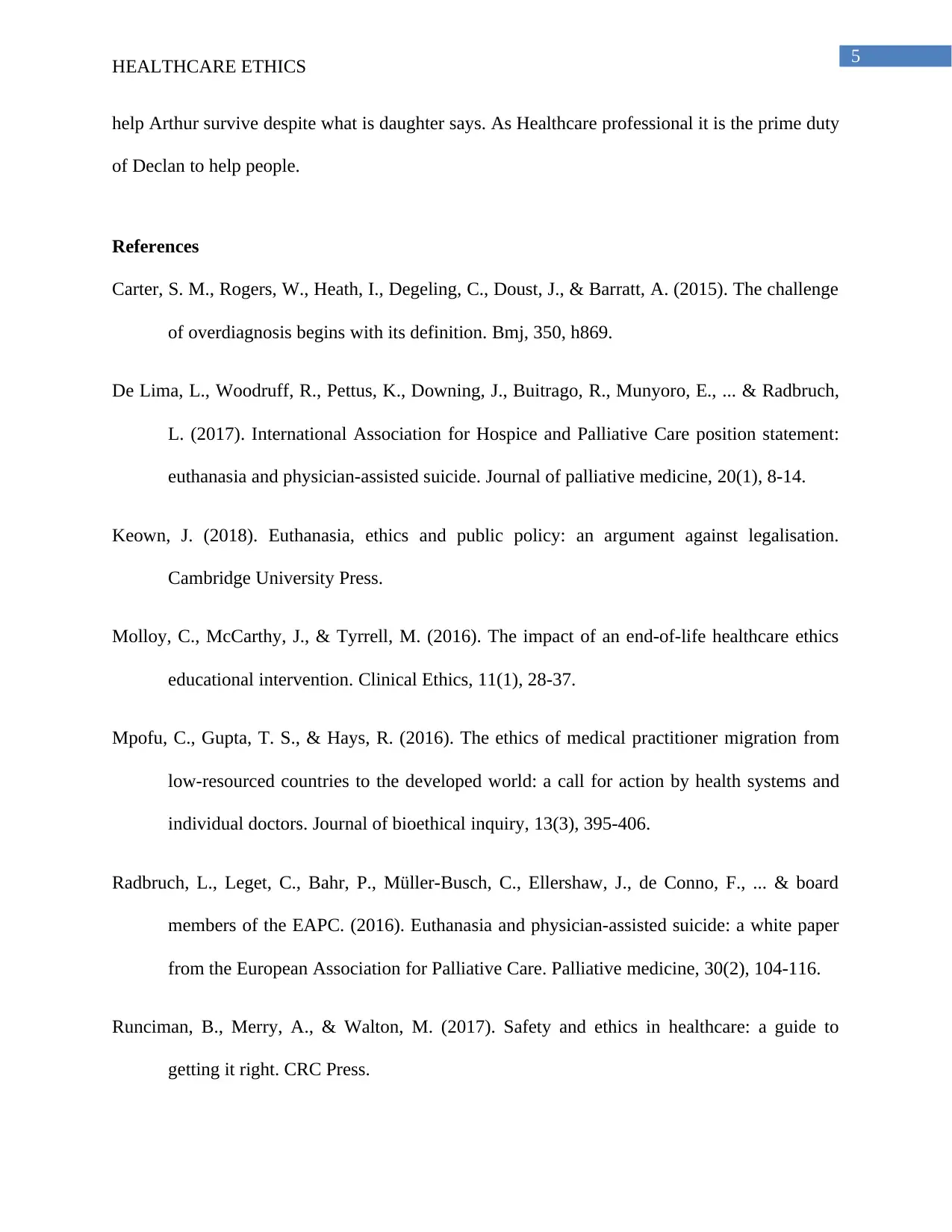
5
HEALTHCARE ETHICS
help Arthur survive despite what is daughter says. As Healthcare professional it is the prime duty
of Declan to help people.
References
Carter, S. M., Rogers, W., Heath, I., Degeling, C., Doust, J., & Barratt, A. (2015). The challenge
of overdiagnosis begins with its definition. Bmj, 350, h869.
De Lima, L., Woodruff, R., Pettus, K., Downing, J., Buitrago, R., Munyoro, E., ... & Radbruch,
L. (2017). International Association for Hospice and Palliative Care position statement:
euthanasia and physician-assisted suicide. Journal of palliative medicine, 20(1), 8-14.
Keown, J. (2018). Euthanasia, ethics and public policy: an argument against legalisation.
Cambridge University Press.
Molloy, C., McCarthy, J., & Tyrrell, M. (2016). The impact of an end-of-life healthcare ethics
educational intervention. Clinical Ethics, 11(1), 28-37.
Mpofu, C., Gupta, T. S., & Hays, R. (2016). The ethics of medical practitioner migration from
low-resourced countries to the developed world: a call for action by health systems and
individual doctors. Journal of bioethical inquiry, 13(3), 395-406.
Radbruch, L., Leget, C., Bahr, P., Müller-Busch, C., Ellershaw, J., de Conno, F., ... & board
members of the EAPC. (2016). Euthanasia and physician-assisted suicide: a white paper
from the European Association for Palliative Care. Palliative medicine, 30(2), 104-116.
Runciman, B., Merry, A., & Walton, M. (2017). Safety and ethics in healthcare: a guide to
getting it right. CRC Press.
HEALTHCARE ETHICS
help Arthur survive despite what is daughter says. As Healthcare professional it is the prime duty
of Declan to help people.
References
Carter, S. M., Rogers, W., Heath, I., Degeling, C., Doust, J., & Barratt, A. (2015). The challenge
of overdiagnosis begins with its definition. Bmj, 350, h869.
De Lima, L., Woodruff, R., Pettus, K., Downing, J., Buitrago, R., Munyoro, E., ... & Radbruch,
L. (2017). International Association for Hospice and Palliative Care position statement:
euthanasia and physician-assisted suicide. Journal of palliative medicine, 20(1), 8-14.
Keown, J. (2018). Euthanasia, ethics and public policy: an argument against legalisation.
Cambridge University Press.
Molloy, C., McCarthy, J., & Tyrrell, M. (2016). The impact of an end-of-life healthcare ethics
educational intervention. Clinical Ethics, 11(1), 28-37.
Mpofu, C., Gupta, T. S., & Hays, R. (2016). The ethics of medical practitioner migration from
low-resourced countries to the developed world: a call for action by health systems and
individual doctors. Journal of bioethical inquiry, 13(3), 395-406.
Radbruch, L., Leget, C., Bahr, P., Müller-Busch, C., Ellershaw, J., de Conno, F., ... & board
members of the EAPC. (2016). Euthanasia and physician-assisted suicide: a white paper
from the European Association for Palliative Care. Palliative medicine, 30(2), 104-116.
Runciman, B., Merry, A., & Walton, M. (2017). Safety and ethics in healthcare: a guide to
getting it right. CRC Press.
⊘ This is a preview!⊘
Do you want full access?
Subscribe today to unlock all pages.

Trusted by 1+ million students worldwide
1 out of 6
Related Documents
Your All-in-One AI-Powered Toolkit for Academic Success.
+13062052269
info@desklib.com
Available 24*7 on WhatsApp / Email
![[object Object]](/_next/static/media/star-bottom.7253800d.svg)
Unlock your academic potential
Copyright © 2020–2026 A2Z Services. All Rights Reserved. Developed and managed by ZUCOL.





